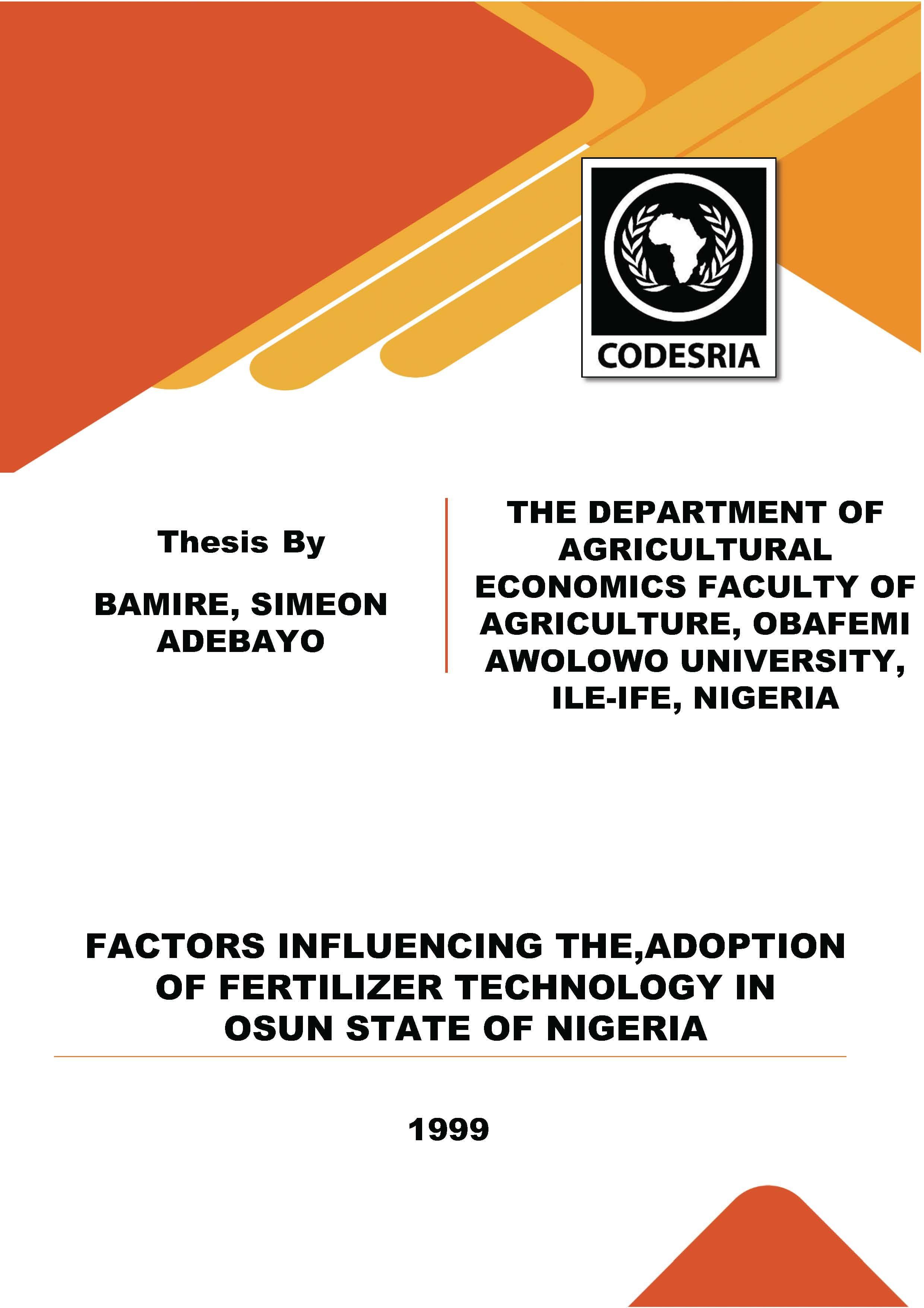Factors influencing the adoption of fertilizer technology in Osun state of Nigeria
Keywords:
Fertilizing, fertilizers, agricultural engineering, fertilizer technology, NigeriaSynopsis
Sustaining the productive capacity of the land resource base under the changing trend of land use systems and increasing population pressure is imperative for the attainment of Nigeria's food selfsufficiency objective. One major approach to this, is increasing the adoption of agricultural technologies that would enhance fanners' productivity and maintain the land resource potential. This study examined those factors that affect fanners' adoption decisions and the extent of use of fertilizer technology in Osun State of Nigeria. Primary data were collected using structured questionnaire and focussed group discussions, while the State's Ministry of Agriculture and the Agricultural Development Project provided secondary information. Multi-stage sampling technique was employed in selecting three hundred respondents from two major ecological zones in the State. Data were analysed using descriptive statistics, correlation analysis, Tobit regression technique, and costs and returns analysis. The socio-economic characteristics of respondents showed that small-scale fanners dominated agriculture with mean farm size of0.58ha for users and 0.62ha for non-users of fertilizer. Average age of farm operators was 51 years. Pressure on land was found high because fannland wa continuously cropped for an average of ten years with a mean fallow period of two years only. Inorganic fertilizer was . the most common intensification technology in use. Results from correlation analysis showed that fann size and net farm income positively influenced farmers' adoption and use of fertilizer across the ecological zones.
Downloads
References
Adebayo, A (1997). 11The Soil - A living body". Inaugural lecture series No. 115,Obaferni Awolowo University, Ile-Ife, Nigeria
Adegbola, AA; Are, L.A; Ashaye, T.l. and Komolafe, MF.(1978). Agricultural science far west African schools and colleges_ Oxford University Press. Ibadan. p 79-92.
Adegboye, RO. (1973)." Compulsory acquisition and the subsequent problems of land resettlement and compensation: Ibadan-Parapo (Nigeria) experience". Bun Rural Economics and Sociology 1(1).p 125-145.
Adesimi, AA (1988). Farm management analysis with perspective through the development process Obafemi Awolowo University, Ile-Ife, p 18-19.
Adesina, AA Zinnah, MM (1992). "Technology characteristics, farmers' perceptions and adoption decisions: A Tobit model application in Sierra Leone". Agricultural Economics, Elsevier science publishers B.V., Amsterdam pp. 297-311,
~Adesina, A., Chianu, J. and Mbila, D. (1997). "Property rights and alley farming technology adoption in West and Central Africa". Paper presented at the workshop on property rights, collective action and technology adoption. ICARDA. November 22-25. Aleppo, Syria
Aduayi, E.A. (1985). "Making the soil nutritious to plants". Inaugural Lecture Series No. 78, Obafemi Awolowo University Press Ltd., Ile-Ife, Nigeria
Agboola, S.A (1979). An agricultural atlas ofNigeria Oxford University Press. NewYork.
Aikens, M.T., Havens, AE. and Flinn, W.L.(1975). "The adoption of innovations: The neglected role of institutional constraints". Columbus, Ohio. The Ohio state university, department of rural sociology (Mimeograph).
Akinola, A.A (1987). "An application of the probit analysis to the adoption of the tractor hiring service scheme in Nigeria". Oxford Agrarian Sbxdies, l6: 70-82.
Akinola, A.A and Young, T. (1985). "An application of the Tobit analysis of agricultural innovation adoption: A study of the use of Cocoa spraying chemicals among Nigerian cocoa farmers" Oxford Agrarian Studies, 14:26-51.
Aldrich, J.H. and Nelson, F.D. (1984). Linear probability, 1ogit and prnbit models Sage University paper series on quantitative applications in the Social Sciences, 07-045. Beverly Hills, CA: Sage.






